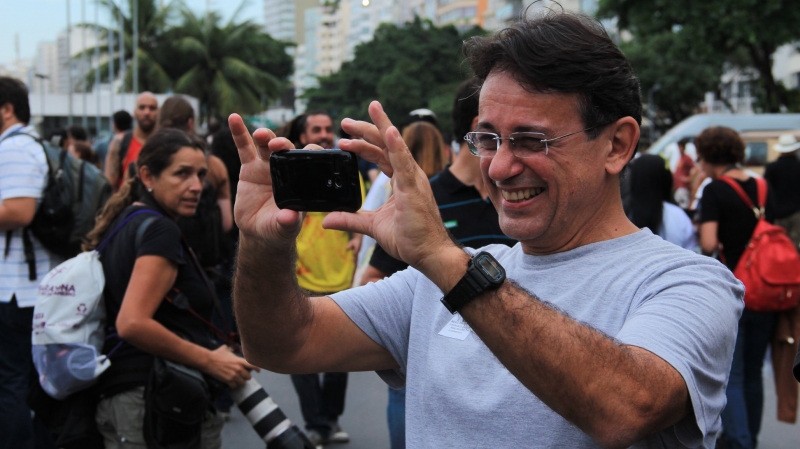I just found out, reading the "AND" from Brazil, that my comrade has died. That Pimenta has died. I knew he was ill, I knew it could not take long, but I'm still beaten, furious and I can not calm down. I curse this day, I think. But I'm not sad, how are you going to be sad thinking about Pimenta?
A few years ago I had the opportunity to meet Pimenta in person, I knew him before, but this time we had time to talk, to exchange and, I think, particularly myself to learn. He explained so many things to me, he explained to me the Brazilian reality, he explained to me what it means to do anti-imperialist work in his country. He explained to me how in the midst of a process of a new democracy proletarian internationalism is applied concretely. He explained to me why the flag of Palestine always flies at the demonstrations in Brazil. He told me about the campaigns to defend the life of Chairman Gonzalo, in support of the People's Wars, in defense of the prisoners of ATIK (he was managing it better there than me, who lives in this country), the defense of Saibaba and all the political prisoners in India. He told me about how it is done to manage these campaigns in a country like Brazil and how to know how to unify at the international level at the same time and I learned. I do not know if I will ever have the handling that he had, I think not, because Pimenta not only had talent, not only had the maximum intelligence of the class, but that – being an intellectual – he was a son of the deepest masses of Brazil. We were in Rio, but I heard the voice of Rondônia, we were in an apartment of the petty bourgeoisie, but he was the voice of the Favela. But not only that, it was not only the cry of rebellion, but the solution. If I think about it well, I can say that what stayed the most in our conversation is the handling of the contradiction that Pimenta had. I, a bit rough to come from the most rough society in the world (in hard struggle with the Yankee society), had not understood well what is the democratic front, of course I had read the books, but Pimenta explained it to me, based on practical examples of his immense experience, he made me understand it well – perhaps for the first time. I was the student and he was the teacher, so it was objectively; but he did not treat me as a student. His form was so simple that, although he in "his line of work" was none other than one of the most important leaders in the world and I a poor ignorant, he always made me feel like his equal. Maybe it was because all the time we were smiling at each other. I do not know how to explain it, and maybe I'm a bit idealistic, but with Pimenta I was always happy; at no time, even when we talked about the methods of torture, genocide and massacres against the people, I ever got depressed; because Pimenta always had in mind that it was not for the pure ones, that it was not in vain, but that in the end we will win, the class and the people. When I write, I realize that this is the great thing about the comrade and what impresses me most about him, the fact that reminded me of what Chairman Gonzalo taught us: "to have the victory in our faces". That was Pimenta’s smile, the smile of victory.
I know that the death of comrade Pimenta leaves a vacuum in the revolutionary movement in Brazil, leaves – without a doubt – a vacuum in the world anti-imperialist movement. But I also know him sowing live and that he is one of those who continues to conquer laurels after death.
My thoughts are with his brave family and with his countless comrades in Brazil and around the world.
I, for my part, raise our flag, the red one with the sickle and the hammer, higher than ever and I make the commitment to give all of myself to serve the people in honor of the fallen comrade, and I am going to do it smiling, with the smile of victory, with Pimenta’s smile.

Comrade Pimenta: Present in the struggle!
One of the writers of Dem Volke Dienen










